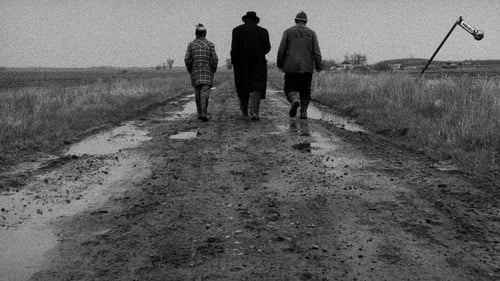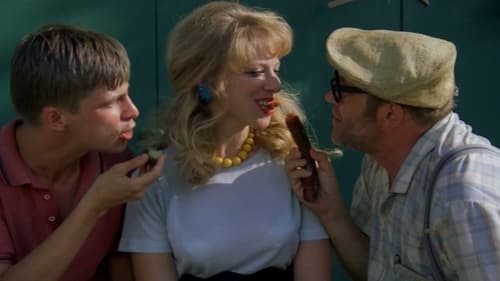Frigyes Hollósi
出生 : 1941-04-21, Budapest, Hungary
死亡 : 2012-12-05

Apa

Karcsi, a Roma policeman, lives with Eva, a Swede. One day he is called to the scene of the murder of a wealthy trafficker named Schulter. He begins to investigate the crime, interrogate neighbours and suspects, and untangle a complex situation - one that he, himself, complicates even further. For he is a gypsy, who despite being adopted and raised by "regular" Hungarians, has his nose rubbed in his minority status every day. The film, which is based on the novel by Ákos Kertész, is a shrewd genre work full of dusky humour and surreal situations. Tabló follows a vivid succession of strange images that eventually lead to the emergence of the central story about a charismatic police officer on a tireless quest for the truth, though he must fight against virtually everyone and is just as fallible as the next person. Tabló makes a statement on the issue of race and racism - or, indeed, relations between any minority and majority.

Tibi bá'

Kálmán

Károly, the Principal
Underrated in light of its current (February 4, 2007) IMDb score of 6.4, this film reminded me of what Joseph Heller's 'Something Happened' could look like if a film was to be made out of it. Our middle-aged character's life is in a fragile balance at the start and soon that balance will, of course, be disturbed. Even without much in the way of drama at first, an at times nightmarish reality intermingles with nightmares, and, typically for a movie from this region, state bureaucracy and the absurdities of a semi-legal order play a role in moving developments along. So what is it that awaits our hero down the informal road he is officially sent? Complete deconstruction? Or the 'unbearable lightness of being'? If you give the movie the time to unfold, it will reward you revealing an entertaining concept by the end.

Érczes nagybácsi

Gazsi igazgató

Interrogating officer
Peter falls in love with Lena, a Bulgarian female student in the days of the 1956 revolution. They were both involved in the events of the Revolution, enthusiastically recount their experiences of an American journalist. The boy's parents leave the country, but he did not go with them.

Inhabitants of a small village in Hungary deal with the effects of the fall of Communism. The town's source of revenue, a factory, has closed, and the locals, who include a doctor and three couples, await a cash payment offered in the wake of the shuttering. Irimias, a villager thought to be dead, returns and, unbeknownst to the locals, is a police informant. In a scheme, he persuades the villagers to form a commune with him.

This story has a horse-race fan main character who sells clothes-hangers On one trip, a young, teenager boy relative goes with him. They have a lot of adventures as they become friends. Girls, dance and horse-racing are the themes while they sell the clothes-hangers this summer...

From the film-shooting in the Buda Castle Marci and his friend go to a well-paying job. The scene is a big castle in the middle of a huge park. They enjoy the company of the Kid and the beautiful naked French girl, Nathalie. Their job is to watch the monitors on which they can see the Moscow coup détat. By the time Gorbachev is executed the Communist and the Nationalists have taken turns in occupying the castle and the park.

Kereskedö

Pillér töstér

Zolestyák
Kató Kelemen is asked by her father to go to his office and welcome an important business partner of his. When Mr. Andersen arrives he assumes Kató is a secretary and instructs her to deliver a letter. He's about to travel to Venice with his nephew who he has never met before. Since Kató falls in love with Andersen at first sight, she decides to dress like a boy and pretends to be the nephew.

On a single day the fate of three couples are joined and some of them sealed.

September 1938. Tenants of a Budapest block of flats live their everyday lives, conducted by tradition. World politics does not divide them. Their major experience is the private life of the actress in the house.

Hungarian family film.

Head Physician of Madhouse
The seeming hopelessness of combatting an all-powerful government that will not tolerate political dissension is the focus of this excellent historical drama set in the mid-19th century in Hungary. In the opening scenes, Hungary has just lost its bid for independence from Austria and a Magyar officer, unable to bear the tragedy of defeat and what it means, says an affectionate good-bye to his beloved horse and then shoots the animal and himself. Two years later, Ferenc (Gyorgy Cserhalmi) is trying to eke out a living for his wife and her family -- and at the same time avoid any hint of sympathy for Hungarian independence because the Secret Police are everywhere. Just as life seems to be going well, Ferenc's former commanding officer (Lajos Oze) arrives and begins discussing revolution again -- a futile pursuit at this point in time. The next day, Ferenc is thrown into an insane asylum and everyone else is arrested as well.

Mici, a pretty young girl is a selected swimmer. Laci, her trainer looks after her jealously, mainly because of her condition.

In this mix of black comedy and harsh drama, a man and wife are divorced yet still have to share their living quarters even though the wife has remarried -- housing is seriously hard to find in Budapest. Csaba (Karoly Eperjes) has just come out of doing a stint in prison because he stabbed a man while drunk, and when he goes home he discovers that his wife (Mariann Erdos) is now living with someone else in their apartment. Csaba quickly divorces his wife but he still has to move in and share a kitchen and bathroom with her and her new mate, suffering because he still loves her. This untenable situation is complicated by visits from Csaba's mother, and by various women he starts seeing, as well as by a busy-body neighbor. The three main roles of Csaba, his wife, and her lover (Peter Andorai) are excellently interpreted in this satire on social morés and economic realities.

Udvarmester
The poor but carefree vagabond Johnny meets the princess Árnika and they fall in love. An evil witch casts a spell on them which turns one of them into a duck. In order to be free of the spell they embark on a long journey to meet King Ajahtan Kutarbani, the only one who can lift the spell.

Tánctanár
Gruber is a normal 16-year-old growing up in Budapest in 1962, but he has a problem -- how does he get to know the opposite sex? At the Sunday afternoon dance classes the young "ladies and gentlemen" hold each other while dancing, and that makes the lessons worth something. Otherwise, the pianist's attention wanders and the orchestra does not exactly play with a single-minded dedication. In fact, everybody seems to have other things on their minds, except for the enthusiastic dance instructor and his ever-smiling assistant.












